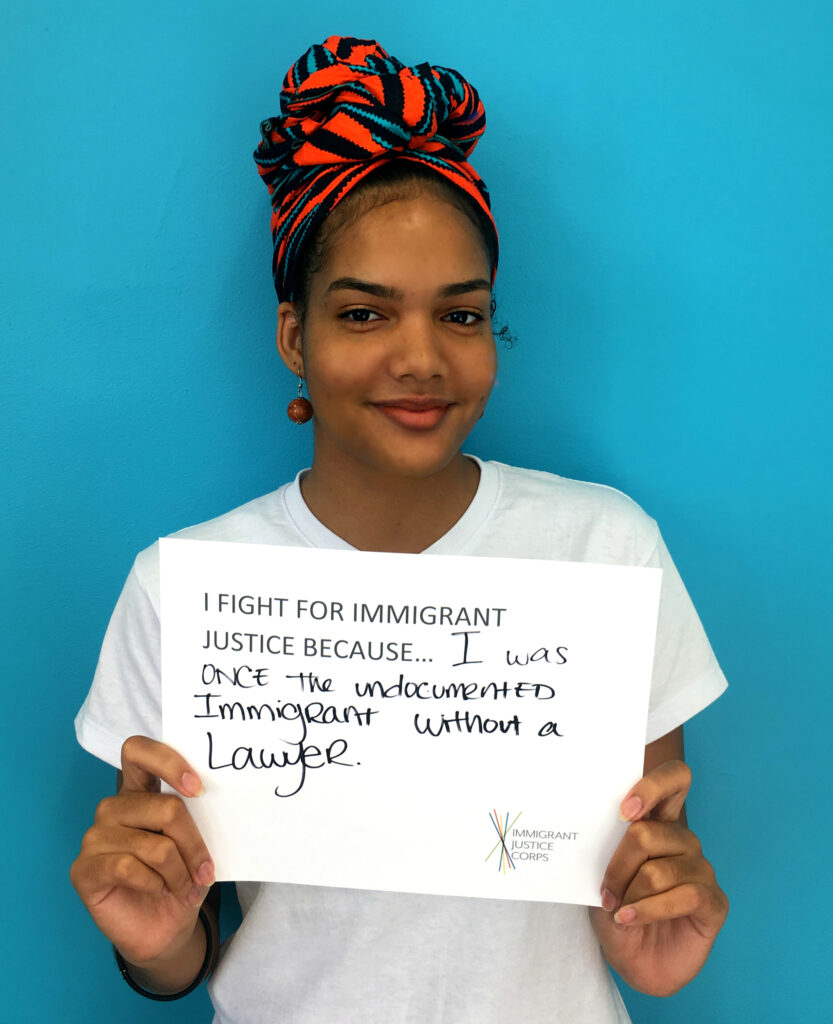Showing up with resilience and passion - Hesley Gonzalez
2024 Justice Fellow Hesley Gonzalez, a Fellow at Public Counsel in Los Angeles, reflects on how she shows up for her clients throughout the immigration process.
Hesley is part of the Unaccompanied Children Program, which was, up until March, funded by the federal government. Without funding, more than 2,000 children represented by IJC Fellows are left with no representation in immigration court, forced to navigate the system by themselves.
In her piece, Hesley explains how she helped one client whose case had reached a dead end, and what she learned from the experience.
As a Fellow, I’ve had the opportunity to engage in a variety of immigration cases, from initial intakes to more complex matters requiring extensive legal research and creative advocacy. But one of the moments that has stayed with me the most involved preparing a motion to reopen. A motion to reopen allows an individual to ask the court to revisit a case that already has a final order of removal. Without reopening a case, a removal order remains in place, preventing any opportunity to seek immigration relief or to move forward with available legal options.
It wasn’t just the legal writing and research that made it memorable, although that part certainly pushed me to grow as an advocate. What stood out was the process: digging through records, identifying procedural issues, and piecing together a legal argument that could breathe new life into a case that others might have written off. It was a chance for my client to have a second opportunity to be heard after missing a critical hearing that, as a child, they had no control over. For almost a year, that missed hearing had defined the case, and this motion gave a real opportunity to move forward.
I spent hours going over case law, transcripts, and prior filings, often feeling the weight of what was at stake. The standards for a motion to reopen are high, but I had support. I worked closely with colleagues, supervisors, and IJC staff who not only encouraged me to think critically and trust my instincts, but also offered guidance, shared advice, and consistently pointed me in the right direction when I needed it most. Every edit and cited regulation felt purposeful, reminding me that even the smallest details can carry weight when someone’s future is on the line. This experience reminded me that advocacy doesn’t always happen in a courtroom. Sometimes it means quietly and methodically challenging a decision. Sometimes it looks like hope disguised as paperwork.
That hope turned into real change when the motion to reopen was granted. I was thrilled—but my client was even more so. Without representation, my client would have continued to live with an outstanding order of removal, which is incredibly dangerous under the current administration. Knowing that our work helped remove that threat was one of the most validating moments of my fellowship.
During my fellowship, I have collaborated closely with other teams within my organization, participated in Know Your Rights presentations (which feel especially critical in the current political climate), and conducted intakes for potential clients. I have also had the opportunity to participate in my own hearings and observe many of my colleagues in theirs. These experiences have given me a broader understanding of the legal landscape and the immense need for strong and compassionate advocacy.
There’s still a lot I don’t know, and I’m okay with that. This year has taught me that being a good advocate isn’t about having all the answers. It’s about asking the right questions, staying curious, and not giving up on the possibility of change. It also means showing up with resilience and passion, especially in a time when the immigration system, and the people who fight within it, are under constant attack.
Working on that motion to reopen reminded me that the law can be rigid, but it also has room for compassion if you know where to look. And that’s the kind of lawyering I want to do: intentional, grounded, and always centered on the dignity of the people we serve.
Want to hear from more Fellows like Hesley? Visit our Fellow Story page to learn more!
